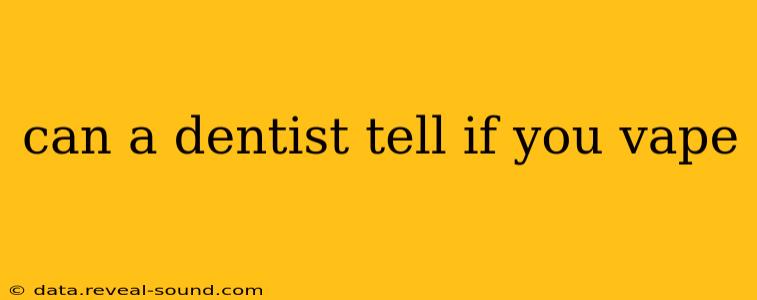Can a Dentist Tell if You Vape?
The short answer is: yes, a dentist can often tell if you vape, although not always definitively. While vaping doesn't leave the same telltale signs as smoking cigarettes, several oral health issues associated with vaping can be easily detected during a routine dental checkup. This article will explore how dentists can identify vaping habits and the oral health consequences of vaping.
What signs might a dentist look for?
Dentists are trained to observe subtle changes in the mouth and gums. Several oral health problems linked to vaping can tip them off:
-
Dry Mouth (Xerostomia): Vaping can significantly reduce saliva production, leading to a dry mouth. This dryness increases the risk of cavities, gum disease, and oral infections. A dentist will readily notice the dryness and inquire about potential causes.
-
Gum Disease (Gingivitis and Periodontitis): Studies suggest a strong correlation between vaping and an increased risk of gum disease. Inflamed, bleeding gums are clear indicators that a dentist will investigate. The chronic inflammation associated with vaping can accelerate the progression of gum disease.
-
Mouth Sores and Leukoplakia: Certain vaping chemicals can irritate the oral mucosa, leading to the formation of mouth sores or leukoplakia—white patches on the gums or inner cheeks. These lesions can be precancerous, so a dentist will carefully examine any suspicious areas.
-
Tooth Staining: While not as prevalent as with cigarette smoking, vaping can still cause staining, particularly with flavored e-liquids containing pigments. The staining might be less intense but is still noticeable to a trained eye.
-
Changes in Taste and Smell: Some vapers experience altered taste and smell perceptions. While not directly observable, a dentist might infer vaping if a patient mentions these symptoms, especially in conjunction with other oral health issues.
How reliable is a dentist's assessment?
It's important to note that a dentist cannot definitively diagnose vaping solely based on oral examination. Other factors can contribute to dry mouth, gum disease, and mouth sores. However, the presence of multiple oral health problems often associated with vaping significantly increases the likelihood that a dentist will suspect vaping as a contributing factor. They may ask direct questions about your habits to confirm their suspicions.
Can a dentist tell the difference between vaping and smoking?
The oral effects of vaping and smoking share some similarities, but there are also differences. Vaping often results in less intense tooth staining than smoking. However, the inflammation and dryness associated with vaping can be just as damaging, if not more so, in some cases. A dentist might find it difficult to definitively distinguish between the two solely based on oral examination. Honesty about your habits is crucial for accurate diagnosis and appropriate treatment.
What should you do if your dentist suspects you vape?
Be honest and open with your dentist about your vaping habits. This will allow them to provide the best possible care and advice. They can discuss the risks associated with vaping and recommend strategies to mitigate the damage to your oral health. Remember, early detection and intervention are key to preventing more serious oral health problems.
Can a blood test reveal vaping?
While not commonly used in routine dental practice, blood tests can detect certain vaping chemicals. However, these tests aren't typically performed unless there's a specific medical reason to suspect severe nicotine or chemical exposure.
In conclusion, while a dentist might not be able to definitively "prove" you vape based solely on a visual examination, the presence of several oral health issues commonly associated with vaping can strongly suggest the habit. Open communication with your dentist is crucial for maintaining optimal oral health regardless of your habits.
